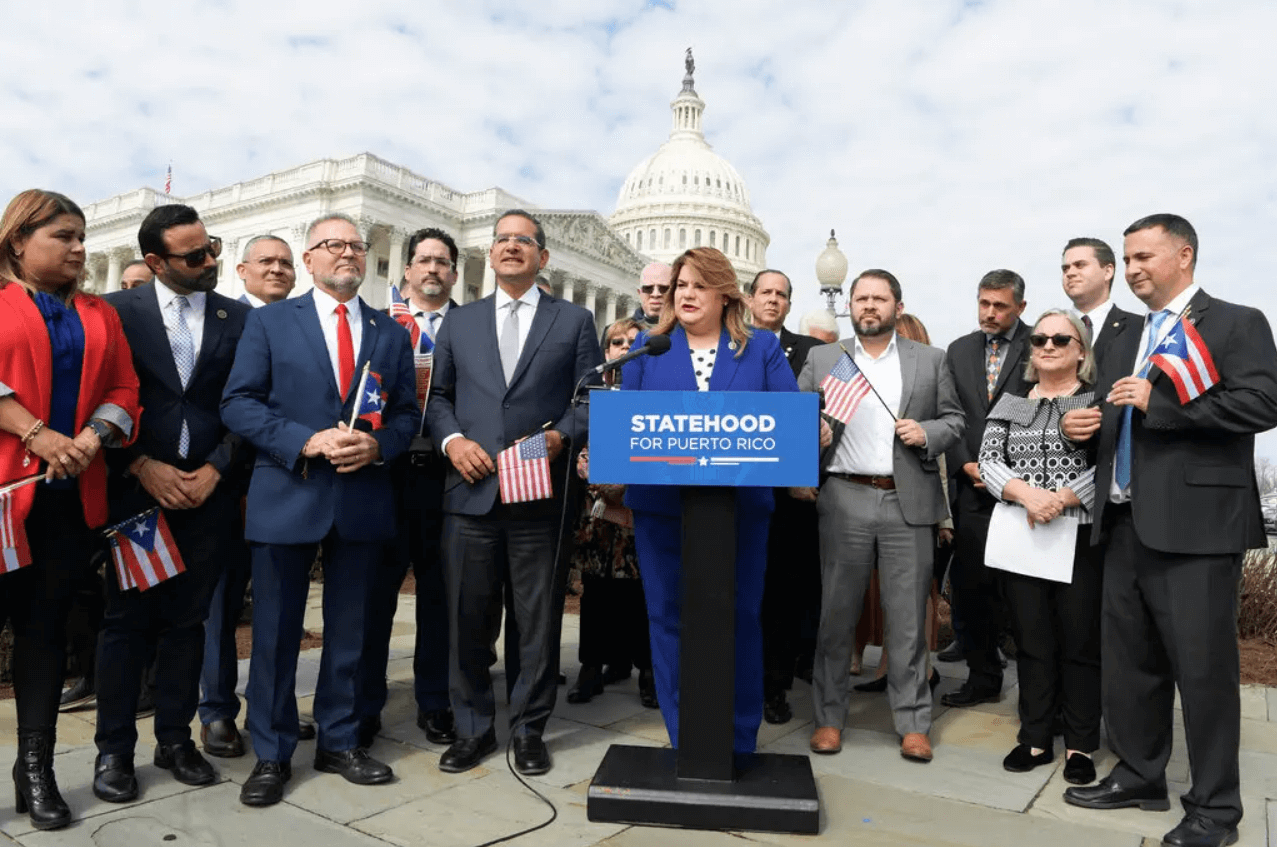On Thursday, the United States (US) House of Representatives passed the “Puerto Rico Status Act” with 233 in favour and 191 against, paving the way for the American territory to hold its first binding referendum to determine its political status.
With the passage of the bill, Puerto Ricans can vote for independence, US statehood, or sovereignty with free association with the US in a plebiscite in November next year.
New: House passes historic self-determination legislation for Puerto Rico with Republicans voting in support.
— Anthony Adragna (@AnthonyAdragna) December 15, 2022
Final vote was 233-191 with 16 Republican yeses. (One member voted late.)@AOC, a main negotiator of the package, presided. pic.twitter.com/zpj5kxjPUx
“It is crucial to me that any proposal in Congress to decolonise Puerto Rico be informed and led by Puerto Ricans,” said Representative Raúl Grijalva (D-AZ), who sponsored the bill and is also the chairman of the House Natural Resources Committee, which supervises affairs in American territories. He noted that the bill was a compromise between members of Congress who previously sponsored competing bills “to end the colonial status of the island.”
It is unlikely that the bill will be passed in the Senate, which would require at least 60 votes. Grijalva insisted, however, that it would nonetheless set “an important historical precedent” for Puerto Rico.
President Joe Biden, too, supported the House verdict, calling on Congress “to act swiftly to put the future of Puerto Rico’s political status in the hands of Puerto Ricans, where it belongs.”
For more than a century, Puerto Rico has been governed under a political system imposed by outside forces rather than established by its people. Denied the right to a vote in Congress or for President, Puerto Rico’s territorial status has left it vulnerable to unequal treatment.
— Nancy Pelosi (@SpeakerPelosi) December 15, 2022
Similarly, outgoing House Speaker Nancy Pelosi (D-CA) said, “Today’s historic vote is a key step toward ensuring that Puerto Rico’s future is one of its own choosing,” adding that “the Democratic House has proudly voted to tear down the vestiges of colonialism.”
Likewise, House Majority Leader Steny Hoyer (D-MD), who has worked on the issue throughout his career, noted that it was “a long and torturous path” to get the legislation to the House floor.
“For far too long, the people of Puerto Rico have been excluded from the full promise of American democracy and self-determination that our nation has always championed,” opined the Maryland Democrat.
Over the past several months, we came together to act on a belief that we all share: this historic legislation will grant Puerto Ricans the self-determination they deserve and allow them determine the future of their island themselves.
— Steny Hoyer (@LeaderHoyer) December 14, 2022
Puerto Rico Governor Pedro Pierluisi of the New Progressive Party, who is known to support US statehood for the territory, was present in Congress for the vote. Calling it a historic day, he admitted, “This has not been an easy fight. We still have work to do,” adding, “Our quest to decolonise Puerto Rico is a civil rights issue.”
He was also supported by Puerto Rico’s Resident Representative in Congress, Jenniffer González, who said the bill would provide the island with the self-determination it deserves. “This bill is not perfect, but at least it will advance the issue,” González said on the House floor. She also pointed out that the House was “recognising and making clear that Puerto Rico’s century-old territorial status is the problem and cannot be part of the solution” by passing the bill.
Today marks a historic day for Puerto Rico! The U.S. House of Representatives voted to pass H.R. 8393 the "Puerto Rico Status Act" for a plebiscite to be held on November 5, 2023, to resolve the Island's political status.#HR8393 pic.twitter.com/YRTOFw0Vua
— PRFAA (@PRFAA) December 15, 2022
“Many of us are not in agreement about how that future should be, but we all accept that the decision should belong to the people of Puerto Rico,” she emphasised.
However, Republicans are worried that Puerto Rico would lean towards the Democratic Party if it chooses to become the US’ 51st state. Furthermore, some do not want one of the poorest islands, with 40% of its population in poverty and speaking Spanish, to be a part of the US.
In this regard, Republican Representative Bruce Westerman (R-AR) noted, “We’ve abrogated all of our responsibilities and authority because it doesn’t come back to Congress for any kind of approval.”
Imagine owning a business in the state of #PuertoRico. 37% Federal Income tax, 15.3% self-employment tax, 3.8% Obamacare tax, 33% state income tax, and an 11.5% sales tax. Plus, since Puerto Rico has more debt per capital than any other state, state taxes will likely be raised.
— Peter Schiff (@PeterSchiff) December 15, 2022
Following the American-Spanish war, Puerto Rico became a US territory in 1898. Though all 3.3 million Puerto Ricans are considered American citizens, they do not have the right to vote in presidential elections nor seek representation in Congress. They do not pay federal income tax and therefore, only a few federal public services are provided to them.
Though Puerto Rico has conducted six referendums to date, only Congress can approve a binding vote. The last plebiscite was conducted in 2020, with a less than a stellar turnout and only 52% in favour of becoming a US state.

